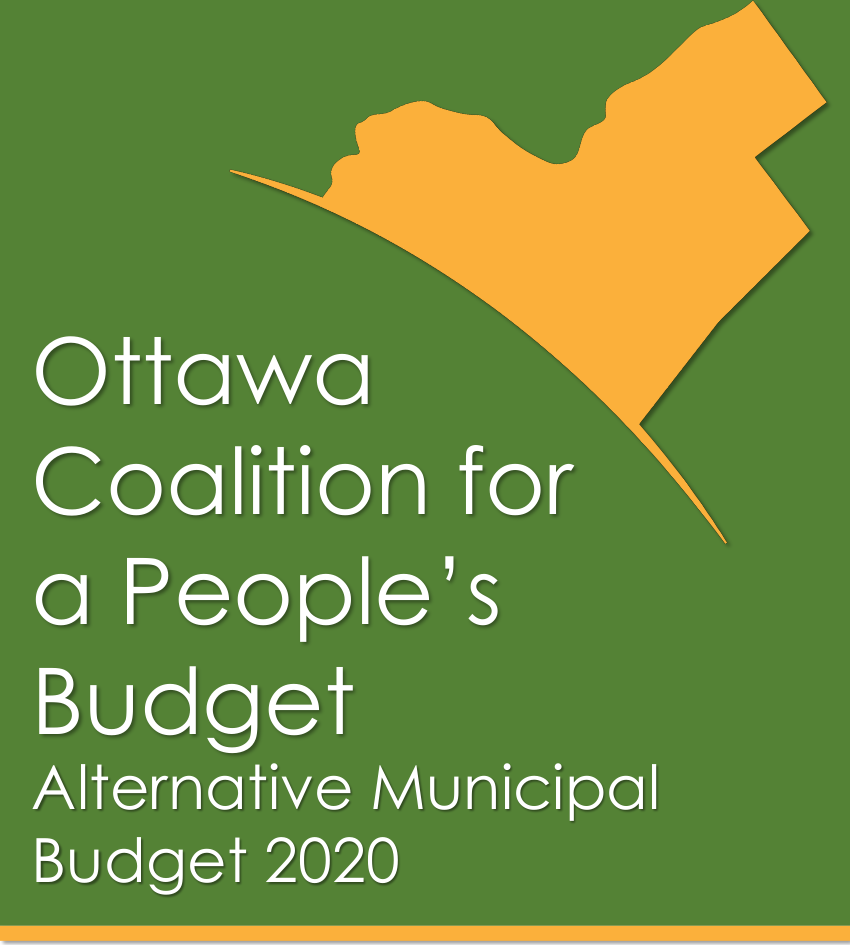
Alayne McGregor
A coalition of 18 community groups has rethought the City of Ottawa budget from an environmental and social justice viewpoint.
The 2020 Alternative Municipal Budget, released November 2, aims to transform the city’s spending and taxing priorities. The 48-page document proposes reallocating money from the police and the use of fossil fuels, spending more on social services, affordable housing and transit, and adding new sources of revenue.
The Ottawa Coalition for a People’s Budget includes groups like the Healthy Transportation Coalition, ACORN Ottawa, the Ottawa Transit Riders Association, Child Care Now Ottawa, Harmony House, and City for All Women Initiative (CAWI). The coalition said this was the first-ever full, costed-out alternative budget for the city.
The budget responds to the housing and homelessness emergency declared by the city in January, and the climate emergency it declared in 2019, the coalition said. It describes its budget as a “bold step to reimagine Ottawa where an ethics of care for people and our environment is at the fore,” and says it puts priority on services “that keep our communities healthy, such as childcare, food security initiatives, and addiction and mental health services.”
About 20 volunteers worked substantively on the budget proposal since the summer, said spokesperson Angela Keller-Herzog, and an economist worked to bring some of the numbers together. They divided the work up by chapters, but also looked at the cross-implications, and met via Zoom. They thought it would be an interesting challenge, but it ended up being “way more work than we had envisaged.”
Members of the coalition had been following and analyzing city budgets for years, but “it’s tough slogging work. [The city budget] seems designed to be somewhat impenetrable.”
They worked from the city’s 2019 budget, but were also able to use the city’s detailed Q2 financial reports, released in September, to get more information on capital projects.
Not all the proposals in the alternative budget could currently be implemented, because some require changes to provincial legislation. Keller-Herzog said it would be extremely difficult to change the official 2021 budget – already released in draft form on November 4 – but she hoped some of its ideas could be incorporated in the 2022 budget.
One of its most drastic changes would be a 63 percent drop ($235M) in the police budget. It proposes that the Ottawa Police Services retain control of investigative services, but all front-line and community relation work, and its respective funding, would be moved to community programs and services. All spending on ammunition and explosives was eliminated in this budget.
It also suggests removal of all transit fares, a more accessible and sustainable transit system with extended routes in underserved, priority areas, “solid ParaTranspo infrastructure,” and replacement of diesel buses with electric.
The budget projects $390M in savings from deferring all capital projects “which invest in fossil fuel infrastructure (new, renewal, maintenance) and have not started or tendered. Priority candidates are transportation and building projects (e.g. fleet renewal, building commissioning).” Keller-Herzog said this means that, for example, furnaces or vehicles at their end of life should be replaced, not by devices that burn fossil fuel, but by those which don’t create emissions, like electric vehicles. As well, buildings being refurbished should be energy-retrofitted.
City investments would be removed from the stock market and “re-invested locally to capitalize Ottawa Climate Finance and Economic Development Corporation to create local jobs and fund transition to a low-carbon economy.”
On the revenue side, the alternate budget proposes increasing parking fees from $3.50 to $4.50 per hour ($8M), increasing the use of red light and traffic cameras ($10M), and implementing a land transfer tax similar to that in Toronto ($65M).
It also recommends a new tax on vacant housing to create incentives for “homeowners to rent their homes to residents that live and work in the City.” When asked how that could be implemented, Keller-Herzog said one way could be to check utility bills for evidence of low use.
Another new tax would be to make property taxes progressive ($66M), charging higher tax rates for those whose homes have higher tax assessments. The proposed brackets would be $250K and under, up to $400K, up to $700K, and over $700K, with the highest bracket having an 85 percent higher rate than the lowest.
This tax might not be popular with Centretowners, who already pay higher taxes on small homes than those in far suburbs, because of market value assessment. It might even be considered to promote sprawl. Keller-Herzog said this did need further study to see how it would shake out for different parts of the city and different types of building owners, “but I definitely think it merits a very good look” and might involve rethinking how assessments are made.
She said one of the reasons for this alternative budget was to break boundaries between budget silos at the city, and have a fresh think about how things are structured.
To see the full alternate budget: ottaltbudget.mailchimpsites.com
To see the official proposed City of Ottawa budget: https://ottawa.ca/en/city-hall/budget/detailed-information-2021-budget
Read more about the 2020 city budget at centretownbuzz.ca
